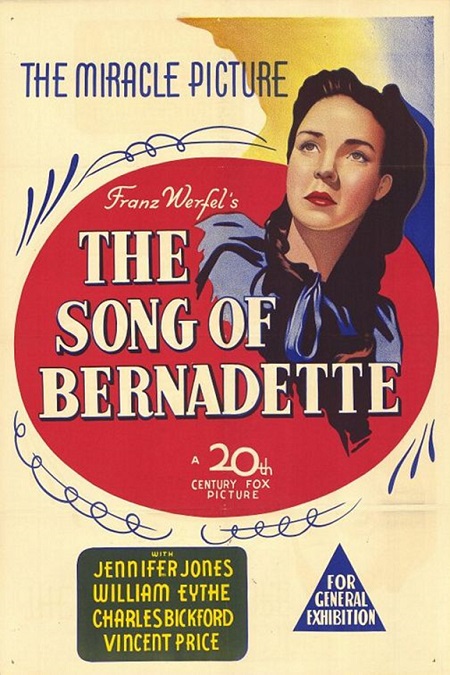


The Song of Bernadette – 1943
I’ll start this review off by saying that I am a religious man, though I am not Catholic. That being said, I found this film to be incredibly good. It was religiously uplifting without being preachy. It was overtly Catholic but seemed to show both positive and negative qualities that can be associated with the Catholic Church. It was incredibly well acted on all fronts and masterfully scripted. The director also did a fantastic job, making good use of unique camera angles and lighting.
The movie starred Jennifer Jones in her big-screen debut. In fact, she did such a good job she won the Academy Award for Best Actress that year. She played the role of Bernadette Soubirous, a 14 year old girl, living in southern France with her parents, and three siblings. She isn’t terribly bright, but she is honest and sincere.
One day she is gathering firewood with her sisters near the local garbage dump and she sees a vision of a lady dressed in white. The lady asks her to come to her for fifteen days. She also says some pretty disturbing stuff like, “You will never be happy in this life, but you will in the next.”
The lady, who only Bernadette can see or hear, is obviously the Virgin Mary. The movie that follows is the story of how Bernadette becomes Saint Bernadette. It goes through the difficulties that the young girl faces as she struggles to obey the lady, who, incidentally, Bernadette never directly identifies as the Virgin – a significant point, since the city officials who spend the entire film interrogating her and attempting to discredit her, try to get her to name the lady, which would give them grounds to legally persecute her.
The various characters all start off thinking Bernadette is hallucinating or making up stories. But through her honesty and her unwavering conviction in the truth of what she is seeing, she wins them all over. At first, only her family follows her, still not believing her story. Then more and more of the poor townsfolk start to follow her and believe her.
Then everything changes when the miracles start happening. A spring of clean water that has healing properties appears. Uneducated Bernadette starts using phrases and concepts that she knows nothing about. Eventually, emperors and bishops hear of her amazing tale and get involved. And through it all, Jennifer Jones maintained her phenomenal performance. The performance was genuine and uplifting and I think she really deserved the Oscar she won.
In addition to Jones, great performances were given by Vincent Price as Prosecutor Vital Dutour, one of her main persecutors, Charles Bickford as Father Peyramale, the priest who grudgingly became a believer, Anne Revere as Bernadette’s mother Louise, and Roman Bonhen as her father Francois.
Also, Gladys Cooper turned in an incredible performance as Sister Marie Therese Vauzous, a nun who hated Bernadette because the Virgin appeared to her. She believed that the only true path to righteousness was through pain and suffering. She spent her life taking as much of both as she could in her efforts toward godliness. Her catharsis and revelation were powerful to watch.
That revelation came in the form of a big reveal for the audience as well. Sister Marie Therese said, “Why were you the one who was chosen? What do you know of suffering?” Bernadette could give no answer but to reveal that she had been suffering all her life in a most unbelievable fashion. She apparently had bone marrow cancer, and for those of us who don’t know, bone marrow cancer is incredibly painful.
As I said, the film was incredibly inspirational and religiously uplifting. The actors all did a fine job, but of course, none of it would have been quite the same without the wonderful score by Alfred Newman, who also won an Oscar for his work on the film. It was very well written, enhancing the images on the screen without being melodramatic or overpowering. The sweetness of the film’s score was delicate and yet powerful at the same time.
And finally, as with all films about historical figures, I have to do a little reading to find out how accurate the film was to real life. Apparently, this one was fairly accurate. A few characters had some altered motives, some points of view were intensified to give it more drama, but for the most part the story was historically true. Some biographies are good enough to tell without having to change much.
True, it was a fictionalized account of miraculous events, and I must leave it to everybody to believe or not believe in the events that allegedly took place, but I’m not so naïve as to believe that I know everything there is to know about the world. Who can say whether the real Bernadette was visited by the Virgin Mary or not?
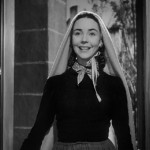
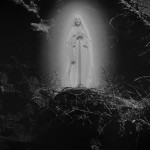
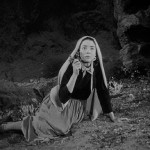
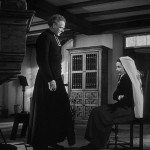

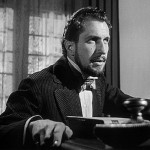
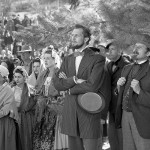
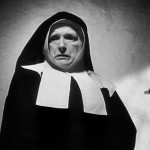
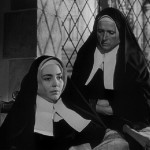
This is an incredibly accurate review of the movie. This is one of the most memorable movies we have ever seen.